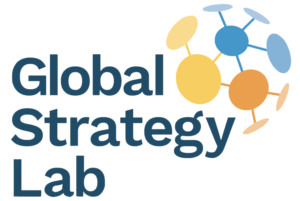
The Global Strategy Lab is concerned with the most pressing global challenges. Directed by Steven J. Hoffman and based at York University and the University of Ottawa, the Lab focuses on three priorities:
1. Generate evidence about different global strategies including when, how and why they can be used to tackle transnational health threats and social inequalities
2. Develop new analytic, empirical and big data methods for evaluating complex global strategies and use them to draw new insights about how to implement global agreements, goals and policies
3. Translate research into evidence-based collective action by working with governments, civil society organizations and international agencies to develop their global strategies and train the next generation of strategic thinkers and leaders in global governance, law and politics
Research Streams
Global Antimicrobial Resistance
Antimicrobial-resistant pathogens arise from the overuse of antimicrobials in humans, agriculture, and the environment, rendering many existing antimicrobial treatments ineffective. Without concerted global collective action, the number of annual deaths due to resistant infections will continue to increase, as will the economic and social impacts of drug resistance.
In order to successfully address the threat of antimicrobial resistance, coordinated global action is needed to bring about new innovation, collaboration, and attention among global health actors and the public. The GSL works to bring the science of global strategy to bear on how to achieve the necessary level of global action.
Global Legal Epidemiology
Global legal epidemiology is the scientific study of international law as a factor in the cause, distribution and promotion of health around the world.
New treaties have often been proposed to address many global health issues, including chronic diseases, nutrition, research and development, and healthcare corruption. With so many calls for treaties, it is imperative that a closer look is taken at their overall potential effectiveness and value for the future. The GSL pioneers new approaches to evaluate existing treaties and inform the design of future international instruments.
Public Health Institutions
Numerous international, national, and sub-national institutions play a critical role in public health. However, relatively little research has been conducted on these public health institutions, and few existing studies draw on the rich body of research in political science, public administration, and international relations. Similarly, the existing literature on public health policy does not typically integrate the insights of political science and, in particular, the rapidly growing body of research on the complex role of science and scientific evidence in policymaking.
The GSL is bridging disciplinary divides to better understand today's public health institutions and advise governments around the world on how to design those capable of addressing tomorrow's challenges.
You may also be interested in...
Recap – How Urban Political Ecology Scholarship can Contribute to Efforts to Address Antimicrobial Resistance
On October 26, Raphael Aguiar presented a guiding framework that focuses on rescaling socio-ecological governance approaches to addressing AMR by considering societal relations with nature that affect AMR at the human-animal-environmental interface. Antimicrobial resistance, pandemics, biodiversity loss, ...Read more about this Post
York U profs with Global Strategy Lab push ambitious 1–10–100 unifying goals on antimicrobial resistance ahead of crucial UN meeting
Originally published by News@York (18 September 2024) Researchers share goals of using a One Health-approach, to save 10 million lives and aim for 100 per cent sustainable access to effective antimicrobials in new policy paper ...Read more about this Post
Recap – Science is Necessary But Not Sufficient for Positive Public Policy Impacts
On January 25, Dr. Jean-Jacques Rousseau used his broad experiences in government in Canada and abroad to comment on instances when scientific and technical advice fails to have a positive influence on public policy: "Science ...Read more about this Post
